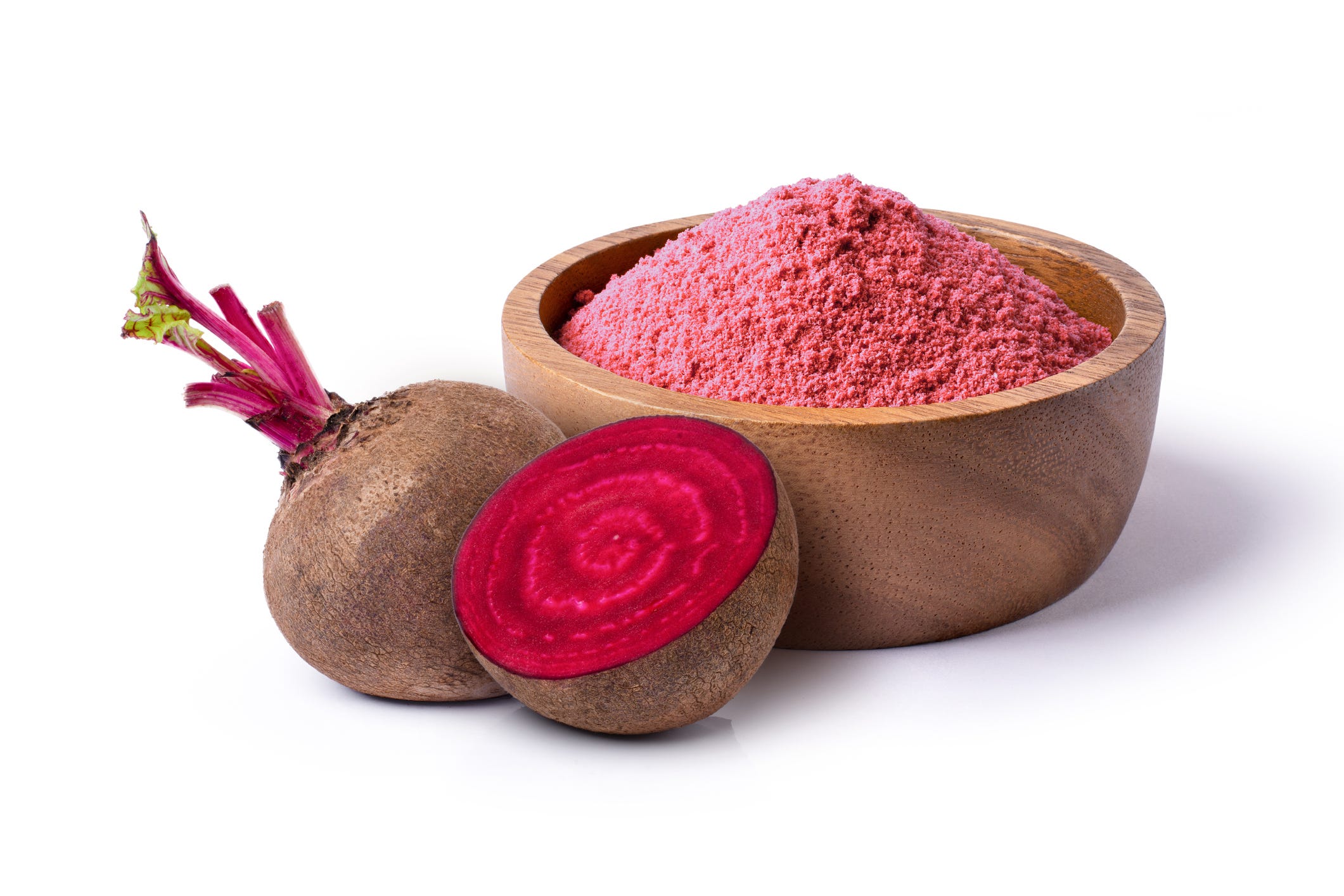
Beetroot – Hard to Beat for Cardio-Metabolic Support
In the realm of functional foods, beetroot emerges as a vibrant contender with promising implications for cardio-metabolic health. Packed with a medley of bioactive compounds, beetroot offers more than just a colorful addition to our plates. For healthcare professionals navigating the intricate landscape of metabolic disorders, understanding the myriad benefits of beetroot can offer a potent tool in the nutritional arsenal. From modulating blood glucose and blood pressure to fortifying microbiome health, beets provide a symphony of benefits that echo the future of dietary interventions in metabolic health. As we guide our patients towards improved metabolic health, it's paramount to spotlight beetroot as a synergistic functional food and dietary supplement, best optimized within the context of a balanced diet and active lifestyle.
Beetroot’s Potent Phytochemicals
This vibrantly colored root vegetable is replete with an array of phytochemicals that possess profound metabolic implications. Central to its arsenal are betalains, which are divided into two subclasses according to their color: the yellow pigments betaxanthins and betacyanin red pigments mainly represented by betanin. Betalains, the red and yellow pigments found in beetroot, have potent antioxidant activity that can help provide important protection to reduce risk of cardiovascular disease.1 Betalains are potent antioxidants that have demonstrated numerous health benefits including reducing oxidative stress and systemic inflammation, improving cardiovascular health, and supporting the liver’s detoxification processes.2 Recent evidence indicates that betalains can improve iron absorption in the gut, improving energy levels.1
Equally compelling are the dietary nitrates in beetroot. In general, nitrates are known to enhance physical performance and recovery in addition to its cardio-protective properties.3 Nitrates are converted to nitric oxide within the body, which has been shown to have numerous cardiovascular benefits. This conversion, initialized by beneficial oral bacteria, causes vasodilation, reducing elevated blood pressure. offering a natural counter to hypertension.4 Further fortifying beetroot's profile are phenolic compounds and saponins. While the former parallels betalains in scavenging oxidative radicals and dousing inflammation, the latter targets cholesterol absorption, preventing its absorption, which provides a strategic approach to lipid management.2 Not to be overlooked, beetroot's dietary fiber serves as a metabolic ally, modulating glucose absorption and cholesterol balance. Together, these constituents position beetroot as a potential cornerstone in holistic metabolic interventions, warranting further exploration and integration into patient care strategies.
Beets Balance Blood Glucose
Beetroot, a humble yet nutritionally potent vegetable, has garnered attention for its remarkable ability to influence blood glucose levels, offering a natural pathway to metabolic health. The reason behind this impact is its impressive profile of nutrients and phytochemicals. For starters, beetroot is an excellent source of fiber, particularly soluble fibers including pectin, cellulose, and arabinose, which have been shown to improve digestion, slow gastric emptying which aids in avoiding undesirable rapid glucose spikes and have a potential weight loss effect.1 Dietary fiber also improves glucose, binds cholesterol in the gut and has prebiotic effects on the gut microbiome.5 This beneficial effect is further amplified by beetroot's medium-ranked glycemic index (GI), meaning its natural sugars are metabolized moderately, and coupled with its fiber content, provides steadier blood sugar control. But the glucose stabilizing benefits don’t end there.
Delving deeper, we find betanin, a derivative of betalains that has exceptional antioxidant and anti-inflammatory properties. This compound tackles oxidative stress and inflammation, common culprits behind insulin resistance, thereby potentially boosting insulin sensitivity.4 Another notable compound, alpha-lipoic acid, although not unique to beets, has shown promise in enhancing insulin use and promoting efficient glucose uptake into cells.4 In essence, beetroot offers healthcare professionals an integrative dietary strategy—combining dietary fiber, a favorable glycemi index, and powerful phytochemicals—for comprehensive blood glucose modulation.Beets Boost Heart Health
Several human clinical trials have explored the potential of beetroot supplementation to support healthy blood pressure, including in both healthy individuals and those with concerns about cardio-metabolic disorders.4 Beetroot offers a synergistic blend of bioactive compounds that collectively support cardiovascular health by improving blood flow, managing blood pressure, reducing inflammation and oxidative stress, and assisting in cholesterol regulation.
Beets are an abundant source of dietary nitrates, which directly affects the circulatory system, improving blood pressure and blood flow. Maintaining healthy blood circulation is crucial for supporting cardio-metabolic health and may aid in the delivery of oxygen and nutrients to the heart and other organs, potentially reducing risk of heart disease, and stroke.
As a nitrate source, consuming beetroot provides the natural ingredient to improve the function of the endothelium, the inner lining of blood vessels, which is important for improving physical endurance and maintaining cardio-metabolic health.4 Dietary nitrates are converted into nitric oxide (NO), a potent vasodilator, allowing for improved blood flow and reduced blood pressure. This process starts in the mouth, with specific oral bacteria facilitating the reduction of nitrates to nitrites, which then become NO in the stomach and bloodstream.4
Beetroot's role in improving blood lipid profiles isn't as direct or pronounced as its effects on blood pressure or blood glucose. However, several components in beetroot may influence lipid metabolism and cholesterol levels indirectly, including beetroot’s betalains, polyphenols, fiber, saponins and folate content.
As mentioned previously, betalains are unique and potent phytochemicals in beetroot that significantly reduce oxidative stress and the risk of atherosclerosis. Betalains stimulate bile acid production which can help reduce cholesterol levels by promoting the excretion of cholesterol from the body. Additionally, betalains have been shown to increase angiotensin II type I receptor gene expression involved in the excretion of cholesterol from the body, further contributing to the reduction in cholesterol levels.4
Beets also contain numerous polyphenols which can indirectly influence lipid metabolism, and may improve HDL:LDL balance. Polyphenols also have a direct impact on the cellular pathways that contribute to the development of inflammation, helping to reduce the production of pro-inflammatory substances.
The dietary fiber in beets has prebiotic effects and along with its saponins, bind cholesterol in the gut, preventing absorption and improving cholesterol levels.2,4 Last but certainly, not least, the B-vitamin folate, is key to reducing elevated homocysteine levels, which if left unchecked, increases the incidence of dysfunctional lipid metabolism and cardiovascular disease.
Beets Balance the Body’s Biome
The body’s microbiome is a complex and delicate ecosys tem of microorganisms, including bacteria, viruses, fungi, protozoa, that play a crucial role in maintaining overall health and wellness. Every mucous membrane is protected by a specialized microbiome. Mucous membranes, by nature, are moist environments and can be entry points for pathogens, making them ideal habitats for protective microbial communities. These communities can help prevent colonization by harmful pathogens by outcompeting them for resources, producing substances that inhibit their growth, or stimulating the host's immune system.1,4 The overall health of the body’s microbiome often relates to its diversity an balance rather than the presence or absence of a single species.
One of the ways in which we can positively impact the body’ microbiomes is by consuming fiber-rich foods, such as beetroot. These dietary fibers, including fructans, have prebiotic effects and when fermented, produce short-chain fatty acids (SCFAs) like butyrate, a primary energy source of colonocytes.5 When consuming beetroot and other sources of dietary nitrates, the conversion of beetroot’s nitrates to nitrioxide actually begins in the mouth via specific bacteria that can reduce dietary nitrates to nitrites. This nitrate-nitrite-NO pathway begins in the mouth and can influence salivary pH, inhibiting pathogenic bacteria and improving oral microbiome balance.4 Interestingly, this highlights the interconnectedness of diet, oral health, and overall metabolic health.
When these nitrites are swallowed and enter the acidic environment of the stomach, they can further be reduced to form nitric oxide (NO) or be absorbed into the bloodstream to be converted into NO elsewhere in the body.1,3 As mentioned previously, nitric oxide has multiple health benefits, including vasodilation, which aids in regulating blood pressure.
The synergy between beetroot and the oral and gut microbiomes underscores the importance of microbiome balance to maximize the cardiovascular benefits of dietary nitrates. It also hints at the broader implications for oral health, as the balance of bacteria in the mouth can influence various aspects of dental and overall health.
Fermented Beets - Fuel for Cardio-Metabolic Health
Fermented beet supplements are gaining attention among healthcare professionals due to the combined benefits of beetroots and the fermentation process. Fermented beet products, often available as powders or liquids, are made via lactic acid fermentation, a traditional method for preserving fruits and vegetables. by allowing natural bacteria and yeasts to break down the sugars in the beets over time. This fermentation can enhance certain health benefits, potentially offering advantages for cardio-metabolic support.6
Fermented beetroot , for example, has been found to contain high levels of Lactobacillus species, which are known for their biome-balancing, probiotic properties including inflammation modulation and improving gut barrier function. Fermentation reduces sugar content and i ncreases the bioavailability of certain nutrients and antioxidants, such as vitamin C and betalains.1,6 Fermentation introduces or amplifies the population of beneficial microorganisms, which can confer probiotic benefits.
Fermented beets also add an additional source of probiotics which can improve gut health and support digestion. The fermentation process can also break down the tough fibers in beets, making them easier to digest and reducing the risk of digestive issues such as bloating and gas. During fermentation, bacteria produce various metabolites that can have health benefits. These include organic acids, peptides, and certain B vitamins. Some of these metabolites might have direct or indirect benefits for cardio-metabolic health, such as improving gut barrier function, reducing inflammation, or modulating lipid metabolism.
A healthy gut microbiome is linked to positive metabolic outcomes, such as improved glucose metabolism and reduced systemic inflammation, both of which are critical for cardio-metabolic health. The concentration of nitrates and other compounds present in beetroot dietary supplements might differ from fresh beets and the fermentation process can vary between products. As always, it's crucial to choose a trusted dietary supplement brand of Premier Quality.
Beets are Hard to Beat for Metabolic Health Support
The array of phytochemicals in beetroot, with their diverse mechanisms of action, provide a multi-faceted approach to supporting metabolic health. By addressing oxidative stress, inflammation, blood pressure, cholesterol absorption, and blood glucose regulation, beetroot's phytochemicals make it a compelling food-based dietary supplement for consideration in managing and potentially preventing cardio-metabolic syndrome.
Beetroot's potential in supporting cardio-metabolic health is grounded in its rich composition of bioactive compounds. From its capacity to regulate blood glucose and its beneficial effects on endothelial health to its influence on the gut and oral microbiomes, the evidence is mounting. Beets play a role in blood pressure management, potentially aid in optimizing lipid profiles, and provide prebiotic support to beneficial gut bacteria.
As healthcare professionals, it's crucial to remain informed about such functional foods that can complement medical interventions. Consider integrating a high-quality fermented beetroot dietary supplement into client protocols, ensuring a holistic approach to managing and preventing metabolic disorders. The synergy of nutrition and medicine is undeniable, and beetroot stands as a testament to this union. Encourage your clients to harness beet’s potential for better cardio-metabolic outcomes.
References
- Babarykin D, Smirnova G, Pundinsh I., et al. Journal of Biosciences and Medicines, 2019. (7):61-79. DOI: 10.4236/jbm.2019.73007. (Accessed February 3, 2023) https://www.scirp.org/journal/paperinformation.aspx?paperid=91009
- Ceclu, Liliana and Nistor, Oana-Viorela. Journal of Nutritional Medicine and Diet Care. 2020, 6:043 Volume 6 | Issue 1 pp.1-9; DOI: 10.23937/2572-3278.1510043 Â (Accessed February 10, 2023) < href="https://clinmedjournals.org/articles/jnmdc/journal-of-nutritional-medicine-and-diet-care-jnmdc-6-043.php?jid=jnmdc">https://clinmedjournals.org/articles/jnmdc/journal-of-nutritional-medicine-and-diet-care-jnmdc-6-043.php?jid=jnmdc
- Sentkowska, Aleksandra and Pyrzynska, Krystyna. Applied Sciences, 2023, 13(13), 7445; doi:10.3390/app13137445 (Accessed August 11, 2023) https://www.mdpi.com/2076-3417/13/13/7445
- Mirmiran P, Houshialsadat Z, Gaeni Z, et al. Nutrition & Metabolism, 2020, 17:3; doi:10.1186/s12986-019-0421-0. PMID: 31921325 (Accessed August 11, 2023) https://pubmed.ncbi.mlm.nih.gov/31921325/
- Valdes, Ana, et. al. British Medical Journal, 2018; 361:j2179; doi:10.1136/bmj.j2179 PMID: 29899036 (Accessed July 25, 2023) https://pubmed.ncbi.nlm.nih.gov/29899036/
- Kazimierczak R, Hallmann E, Lipowski J, et al. Journal of the Science of Food and Agriculture, 2014. Oct;94(13):2618-29. doi: 10.1002/jsfa.6722. PMID: 24798659 (Accessed August 11, 2023) https://pubmed.ncbi.nlm.nih.gov/24798659/
Jenny Perez is an herbal educator, researcher, and writer who has been immersed in the field of nutrition and botanical medicine for more than 20 years. Jenny has created curriculum, content, and educational materials for Quantum Nutrition Labs, Premier Research Labs, the American Botanical Council, and Bastyr University’s Botanical Medicine Department where she was Adjunct Faculty, Herb Garden Manager, and Director of the Holistic Landscape Design certificate program.









